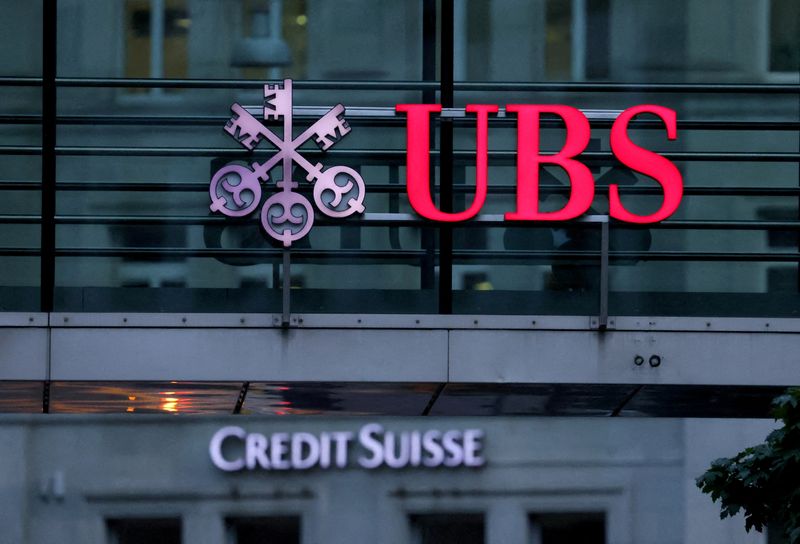By John Revill
ZURICH (Reuters) -UBS's rescue takeover of Credit Suisse (SIX:CSGN) a year ago has created "new risks and challenges" for the Swiss economy, the Organisation for Economic Cooperation and Development said on Thursday, the latest international forum to raise concerns about the deal.
The acquisition may have safeguarded financial stability, but also raises questions about UBS's domestic dominance and the need for stronger financial regulation in future, the OECD said in its economic review of Switzerland.
The biggest bank merger since the global financial crisis, orchestrated by the Swiss state to avert Credit Suisse's collapse, created a group whose assets dwarf the economic output of the country.
"The state-facilitated acquisition of Credit Suisse by UBS ... effectively stabilised the growing crisis within Credit Suisse and tamed risks of spill-overs, thus safeguarding financial stability, but it raises new risks and challenges," the OECD said.
"UBS – already a global systemically important bank before the merger – has thus become even larger and according to the 'too big to fail' (TBTF) regulations, it must meet even stricter regulatory requirements," it added.
The Financial Stability Board, a grouping of central bankers, treasury officials and regulators from the group of 20 top global economies, last month highlighted the risk a failure of UBS would pose to Switzerland and urged Bern to strengthen its controls on banks.
The Swiss government is due to make proposals in the next few months on how to toughen up regulations covering big banks, including increasing the powers of the primary supervisor, FINMA, which has demanded better tools.
The OECD raised questions around competition, with the new combined bank having a roughly 25% share of domestic deposits and loans, according to data from the Swiss National Bank.
Switzerland's competition commission favours a deeper investigation into UBS's dominance of certain parts of the market, Reuters reported last month.
UBS CEO Sergio Ermotti has dismissed critics' warning about the lender's size, saying it was low risk, as well as stronger and more diversified after the acquisition of Credit Suisse.
In its report, the OECD also highlighted how efforts by investors seeking compensation for 16 billion francs of Credit Suisse's Additional Tier 1 (AT1) bonds that were written off could lead to "costly litigation and uncertain outcomes."
The Swiss government said it noted the OECD's analysis and the recommendations made in the report.
In its economic forecasts for Switzerland, the OECD predicted the economy would grow 0.9% in 2024 and 1.4% in 2025, below the country's long term average growth rate of 1.8%, and the government's December forecasts of 1.1% and 1.7%, respectively.
"Weak foreign demand, tighter financing conditions and heightened uncertainty weigh on the economy," the OECD report said.
Still, the buoyant Swiss labour market should be able to absorb the "sizeable" jobs losses the bank merger will bring, the Paris-based organisation said.
The ultra expensive Swiss housing market had shown signs of cooling down, it also said, but vulnerabilities remained - with properties estimated to be overvalued by up to 40%.
The price for an average apartment in Switzerland has risen to just over 1 million Swiss francs ($1.13 million), according to the Swiss Real Estate Database.

In Zurich, the average price for an apartment is now 1.8 million francs, up from 1.2 million francs in 2013.
($1 = 0.8829 Swiss francs)